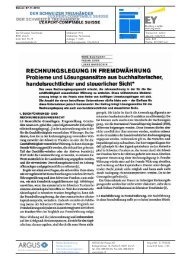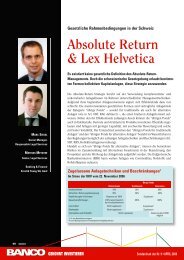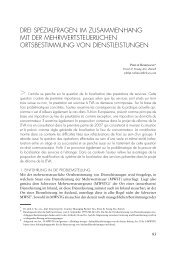Swiss Biotech Report 2006
Swiss Biotech Report 2006
Swiss Biotech Report 2006
You also want an ePaper? Increase the reach of your titles
YUMPU automatically turns print PDFs into web optimized ePapers that Google loves.
30PROGRAMMED DEATH FOR TUMOUR CELLSFrom left:René Goedkoop MDVice PresidentClinical DevelopmentJean-Pierre Rosat, PhDChief Ececutive OfficerEric Lucien, MBAVice PresidentCorporate DevelopmentAPOXIS A“by-product” of the innovation environmentat the University of Lausanne, this biopharmacompany is on its way to becoming a leader in thearea of cancer treatment using controlled apoptosis.Apoptosis – programmed cell death – plays an importantrole in the potential conquest of cancer. One goalof cancer research is to trigger controlled apoptosisin degenerate cells. But the search for possible therapiesfor autoimmune diseases is also headed in thisdirection.This is a trend that professors Lars E. French and JürgTschopp recognised early on. They are the foundersof Apoxis, a biopharmaceutical company in Lausanne.The results and developments produced by their researchin this area formed the basis for the company,which only existed in their imagination until 2002. “Thecompany became a real enterprise in 2002,” explainsCEO Jean-Pierre Rosat, who joined Apoxis at that time.EFFICIENT PROCESSESRosat has founded numerous companies and hasmany years of management experience in the biotechnologyarea. The same is true of COO CédricHaenni, who joined Apoxis in 2002. It was clear toboth the company founders and the new managementteam that the company needed professionalstructures from the outset. “Next to a good pipeline,smooth and efficient processes are crucial for thesuccess of a biopharmaceutical company,” explainsRosat. The close collaboration with Tschopp’s laboratoryat the University of Lausanne means that thereis a sustainable and successful source of innovationto feed the development pipeline.Apoxis has discovered two new molecules in the tumournecrosis factor (TNF) family, which have beenout-licensed to Biogen Inc. In-house projects includedevelopment of molecules that can specifically activateapoptosis of tumour cells. One of these proteins,has shown promising results in hard-to-treat cancers.In other projects, molecules developed by Apoxishave shown the ability to inhibit apoptosis in animalmodels and can potentially be used to treat manyauto-immune diseases. Moreover, preclinical studieshave also validated a new approach for treating agenetic disease based on a single protein injectionsoon after birth.SPIRIT AND SOLID EXPERIENCEManagement’s current goal is to transform the companyfrom a research and development firm into aproduct-oriented enterprise. “Although 28 out of almost40 employees are researchers, they are not justdoing basic research but are hired to develop products,”explains Rosat. “We will begin the clinicalphase with two of our products in <strong>2006</strong>, and if everythinggoes well one of them will be ready for the marketby 2009.”Apoxis is currently involved in a third round of financing.The Lausanne company already raised EUR 7.5million in 2003 and EUR 15 million in 2005 fromHealthCap (the lead investor), Banexi Ventures Partners,Novo Nordisk and three private investors, andRosat is optimistic that the third financing round willalso be successful. Although it can still be difficult toraise capital, Apoxis apparently meets many of thecriteria that potential investors look at. “We have aprofessional management team with a mix of entrepreneurialspirit and solid experience in pharmaceuticals,and we have a certain maturity and a verypromising pipeline.”@For further information please visitwww.apoxis.ch
















